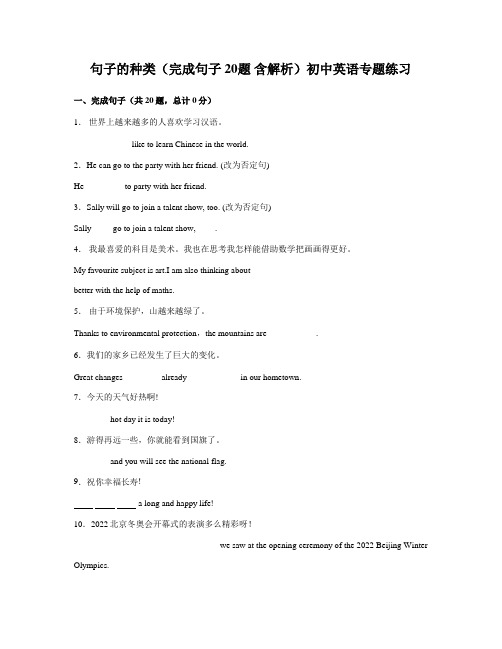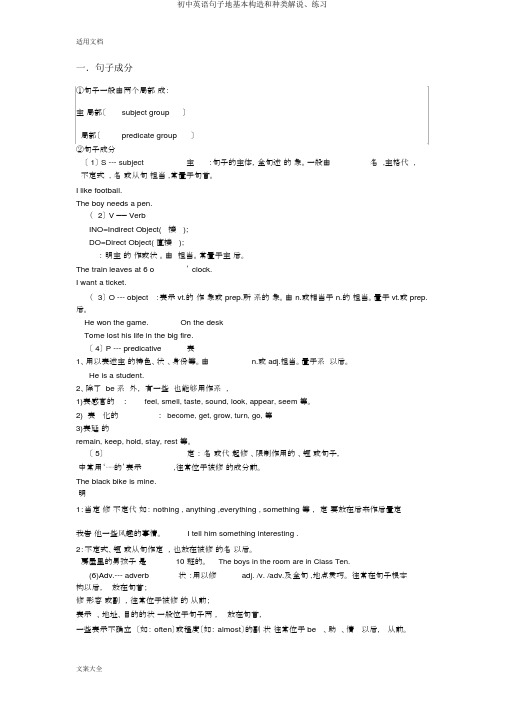初中中-句子种类(二)
初中英语句子成分和五大基本句型_2

18/9/15
23
一) 挑出下列句中的宾语 ① My brother hasn't done his homework. ② People all over the world speak English. ④ How many new words did you learn last class? ⑤ Some of the students in the school want to go swimming, how about you? ⑥ The old man sitting at the gate said he was ill.
them,everything
主,宾,表
good,interesting
定,表
almost ,bravely
状
nine, first
定,表
and ,but,because, that, 不做成分
while
near, from, in, on, at
不做成分
a, an, the
不作成分
hello ,oh, well
• 它可以由名词,形容词,副词,介词短语,不定式,现 在分词和过去分词充当. • If you let me go, I’ll make you king.
• Leave the door open.
•We found John out when we arrived.
• Make yourself at home.
18/9/15
15
• 1.主语:主语是在句子中说明全 句中心主题的部分.一般由名词,
代词,不定式,动名词或从句充当 .它的位置一般在句首.
The girl is pretty.
句子的种类(完成句子 20题 含解析)初中英语专题练习 (2)

句子的种类(完成句子 20题含解析)初中英语专题练习一、完成句子(共20题,总计0分)1.世界上越来越多的人喜欢学习汉语。
like to learn Chinese in the world.2.He can go to the party with her friend. (改为否定句)He to party with her friend.3.Sally will go to join a talent show, too. (改为否定句)Sally go to join a talent show, .4.我最喜爱的科目是美术。
我也在思考我怎样能借助数学把画画得更好。
My favourite subject is art.I am also thinking aboutbetter with the help of maths.5.由于环境保护,山越来越绿了。
Thanks to environmental protection,the mountains are .6.我们的家乡已经发生了巨大的变化。
Great changes already in our hometown.7.今天的天气好热啊!________ hot day it is today!8.游得再远一些,你就能看到国旗了。
________ and you will see the national flag.9.祝你幸福长寿!a long and happy life!10.2022北京冬奥会开幕式的表演多么精彩呀!________ ________ ________ ________ we saw at the opening ceremony of the 2022 Beijing Winter Olympics.11.不要砍伐树木。
我们的环境已在危险之中。
(cut)Don’t ________ trees. Our environment is in danger.12.她家人口多,我家也是。
句子成分和句子种类

4. There ______ two pictures and a map of China on the wall.
A. are B. has C. have D. is
5. Neither he nor I _______ going to the park. A. be B. is C. are D. am
What _d__id__ Ann ___d_o__ last year?
c. 常见疑问词(组):what, what+名词 (如: what colour, what grade等), when, why, where,who (whom), which, whose, how, how+形容词/ 副词 (如: how long, how far, how often, how soon 等)。要注意以上各种疑问词(组)的用法。
(二)突破方法 1、掌握陈述句的肯定式、否定式和除no, not以外的
表示否定意义的词。 2、注意疑问词的意思和用法,重点掌握反意疑问句。 3、掌握否定祈使句,let开头的祈使句,加强语气的
祈使句。 4、掌握what和how引导的感叹句和一些特殊形式。
【知识清单】 初中生需要掌握的句子种类
肯定句 1、陈述句
[例1] They had lots of friends in China.
They _d_id_n_’_t have _m__a_n_y_ friends in China.
[例2] I could dance and sing when I was five
years old.
I _c_o_u_l_d_n_’t_ dance ___o_r__ sing when I was
初中英语语法基础 句子结构和类型专题讲解 (附同步练习题无答案)

初中英语语法基础句子结构与类型专题讲解一.句子的种类(一)根据结构划分:①简单句:(5种基本句型)S+Vi(主+谓)S+V系动词+ P (主+系+表)S+Vt+O(主+谓+宾)S+Vt+IO+DO(主+谓+间宾+直宾)S+Vt+O+OC(主+谓+宾+宾补)②并列句and, but, or, soThis is me and these are my friends.They must stay in water, or they will die.It’s not cheap, but it is very good.It was late, so I went to bed.③复合句:包含一个主句和一个或几个从句的句子叫复合句,从句由引导词或连词引导。
名词性从句(宾语,主语,表语,同位语)从句形容词性从句(定语从句)副词性从句(状语从句)(二)根据功能划分:陈述句, 祈使句, 感叹句,疑问句(一般疑问句,特殊疑问句,选择疑问句,反意疑问句等)1)陈述句:说明一个事实或陈述一种看法。
例如:Light travels faster than sound.光比声传播速度快。
(说明事实)The film is rather boring.这部电影很乏味。
(说明看法)2)疑问句:提出问题。
有以下四种:a. 一般疑问句:Can you finish the work in time?b. 特殊疑问句:Where do you live?c. 选择疑问句:Do you want tea or coffee?d. 反意疑问句:He doesn't know her, does he?3)祈使句:提出请求,建议或发出命令。
Don't be nervous!Let’s go fishing tomorrow.4)感叹句:表示说话人惊奇、喜悦、愤怒等情绪。
What good news it is ! How beautiful the girl is !二.简单句的基本句型介绍:1. 基本句型一:S+Vi (主+不及物动词)主语:可以作主语的成分有名词,主格代词,动词不定式,动名词等等。
初中英语句子结构

初中英语句子结构分析一. 句子的种类(一)根据结构划分:① 简单句:(5种基本句型)S+Vi(主+谓)S+V系+ P (主+谓+表)S+Vt+O(主+谓+宾)S+Vt+IO+DO(主+谓+间宾+直宾)S+Vt+O+OC(主+谓+宾+宾补)②并列句 and, but, or③复合句:名词从句(宾,主,表,同)副词从句(状语从句)形容词从句(定语从句)(二)根据功能划分:陈述句, 祈使句, 感叹句,疑问句(一般疑问句,特殊疑问句,选择疑问句,反意疑问句等)二.简单句的基本句型介绍:1. 基本句型一:S +Vi (主+不及物动词)主语:可以作主语的成分有名词,主格代词,动词不定式,动名词等等。
主语一般在句首。
谓语:谓语由动词构成,是英语时态、语态变化的主角,一般在主语之后。
不及物动词(vi.)没有宾语,形成主谓结构,如:1. We │come.2. The sun│rose.此句型的句子有一个共同特点:即句子的谓语动词都能表达完整的意思。
这类动词叫做不及物动词,后面可以跟副词、介词短语、状语从句等。
2. 基本句型二:S + V系 + P(主+系+表)此句型的句子有一个共同的特点:句子谓语动词都不能表达一个完整的意思,必须加上一个表明主语身份或状态的表语构成复合谓语,才能表达完整的意思。
这类动词叫做连系动词。
如:1. This │is │an English-Chinese dictionary.2. The dinner │smells │good.3. He │is growing │tall and strong.系动词主要是起到连系主语和表语的作用。
可分四类:1. 表“是”如:be“是”(am, is, are, was, were)2.表“感觉” 如:look看起来feel感到,sound听起来,smell闻起来,seem似乎3. 表“变” 如:get变得, turn变得, grow变得,go变得, come变得, become成为4. 表“保持” 如:keep保持, stay保持常用连系动词的用法:① 变成,变得:become, come, fall, get, go, grow, run, turn口诀:好是come,坏是go; 天气、外貌慢慢grow; 流水、金钱缓缓run;颜色、天气大不同turn;get / become口语化,如果要说就用它.口诀解读:Come 一般表示事物由坏变好,结果是好的。
初中英语语法句子的种类

初中英语语法句子的种类英语是国际通用语言,掌握良好的英语语法对于初中学生来说至关重要。
在学习英语语法时,了解并掌握不同种类的句子结构和用法是必不可少的。
本文将介绍初中英语语法中常见句子的种类,并对其结构和用法进行详细解析。
一、陈述句(Declarative Sentence)陈述句是最常见的句子类型,用于陈述事实、描述情况等。
陈述句一般由主语和谓语构成,常见的谓语动词有实义动词和系动词。
例如:1. My brother likes playing basketball.(我的弟弟喜欢打篮球。
)2. The cat is black.(这只猫是黑色的。
)二、疑问句(Interrogative Sentence)疑问句用于询问问题,一般以动词开头。
根据回答方式,疑问句可分为一般疑问句和特殊疑问句。
1. 一般疑问句(Yes/No Questions):一般疑问句的回答通常是“Yes”或“No”。
构成方式:助动词(或者是be动词)+主语+谓语动词(去掉助动词)+其他?例如: Are you happy?(你开心吗?)Does he like swimming?(他喜欢游泳吗?)2. 特殊疑问句(WH-Questions):特殊疑问句通常以疑问词(如what, where, when, why, how等)开头,回答需要提供具体信息。
例如:What is your name?(你叫什么名字?)Where does she live?(她住在哪儿?)三、祈使句(Imperative Sentence)祈使句用于表达请求、命令或建议等,一般省略主语。
常用动词原形构成祈使句,例如:1. Sit down, please.(请坐。
)2. Don't be late for class.(上课不要迟到。
)四、感叹句(Exclamatory Sentence)感叹句用于表达强烈的感情或情绪。
常常以感叹词(如how, what 等)开头。
初中英语语法大全-句子种类

初中英语语法大全-句子的种类按照英语句子的使用目的和用途,句子可分为四类:陈述句(Declarative Sentence)、疑问句(Interrogative Sentence)、祈使句(Imperative Sentence)和感叹句(Exclamatory Sentence)。
陈述句包括肯定陈述句和否定陈述句。
疑问句有一般疑问句、特殊疑问句、选择疑问句和反意疑问句。
图解语法1. 陈述句说明一个事实或陈述一个人的看法,陈述句包括肯定陈述句和否定陈述句特别提示:肯定陈述句改成否定句或一般疑问句时,如句中有already,some,something,somebody等词,须分别改成yet,any,anything,anybody等。
另外,也要注意,too改成either,both改成neither,all改成none等。
2. 疑问句3. 常用的特殊疑问句4. 特殊的反意疑问句①主句是祈使句时,“will you?”意为“请求”,“won’t you?”表示提醒对方注意。
例句:Look at the blackboard, will you / won’t you?Don’t be late again, will you?②感叹句后的反意疑问,用一般现在时态的否定形式例句:What fine weather, isn’t it?How beautifully she sings, doesn’t she?③陈述部分是“I am …”时,用“aren’t I?”而不用“am not I?”例句:I'm working now, aren’t I?④陈述部分主语是everything,nothing,anything或something 时,疑问句主语用it例句:Something is wrong with my radio, isn’t it?Nothing is difficult, is it?⑤陈述部分的主语是somebody, nobody, everybody, anybody, no one,none, neither 时,疑问句的主语用they例句:Everyone is here, aren’t they?No one knows about it, do they?⑥陈述部分的主语是:1) this或that时,问句的主语用it2) these或those时,问句主语用they3) there be句时,反意疑问句中用there例句:This is a plane, isn’t it?These are grapes, aren’t they?There was a hospital here, wasn’t there?⑦陈述部分的主语是one时,问句的主语可用one,也可用you (美语用he)例句:One should be ready to help others, shouldn’t one?⑧陈述句中有few, seldom, never hardly,not,rarely,no,nobody,too…to等时,疑问句部分用肯定结构;如由前后缀构成否定词,疑问句部分仍用否定结构例句:He is never late for school, is he?You got nothing from him, did you?It is useless, isn’t it?⑨陈述部分主语是从句、不定式(短语)、动词-ing形式时,疑问句的主语用it例句:What you need is more important, isn’t it?⑩陈述部分由think, believe, suppose, imagine等引导的宾语从句:1) 主语是第一人称时,问句与从句的主谓语一致2) 主语是其他人称,问句与主句的主谓语一致例句:I think he will come, won’t he?I don’t think he can pass the exam, can he?He believed you had seen her before, didn’t he?? have是实义动词时,疑问句用助动词do,does,did;have 是助动词,则不然例如:They had a meeting just now, didn’t they?She’s been to many places of interest, hasn’t she?? 陈述部分有have /has /had to 时,疑问句要用助动词的否定形式例句:You have to water the vegetables now, don’t you?? 陈述部分有had better时,疑问句中用hadn’t刘局:We had better go to school at once, hadn’t we?? 陈述部分有must:1) 作“一定;必须”解释时,疑问句用mustn’t或needn’t;2) 表示推测,作“一定是;必定”解释时,疑问句需根据其后的动词原形选用相应的形式;3) 对过去动作推测时,问句的助动词用did或have;4) 对过去的状态推测时,问句的be用was例句:He must work hard at physics, mustn’t he?You must go to Guangzhou, needn’t you?You mustn’t smoke here, must you?Tom must be at home, isn’t he?She must have finished her work, hasn’t/didn’t she?He must have been a policeman, wasn’t he?? 陈述部分有ought to,used to,疑问句要用 shouldn’t,usedn’t / didn’t例句:Jill used to be a teacher, usedn’t / didn’t she?? 陈述句部分是复合句时,疑问句的主语和助动词要与主句一致例句:He was reading when the teacher came in, wasn’t he?特别提示:反意疑问句是“否定陈述句+肯定问句”时,如回答内容是肯定的,用“Yes+肯定结构”,反之,用“No+否定结构”。
初中英语句子地基本结构和类型讲解、练习

一.句子成分①句子一般由两个局部成:主局部〔subject group〕局部〔predicate group〕②句子成分〔 1〕 S --- subject主:句子的主体,全句述的象。
一般由名,主格代,不定式 ,名或从句担当,常置于句首。
I like football.The boy needs a pen.(2〕 V —— VerbINO=Indirect Object( 接 );DO=Direct Object( 直接 );:明主的作或状。
由担当。
常置于主后。
The train leaves at 6 o’ clock.I want a ticket.(3〕 O --- object :表示 vt.的作象或 prep.所系的象。
由 n.或相当于 n.的担当。
置于 vt.或 prep.后。
He won the game.On the deskTome lost his life in the big fire.〔 4〕 P --- predicative表1、用以表述主的特色、状、身份等。
由n.或 adj.担当。
置于系以后。
He is a student.2、除了 be 系外,有一些也能够用作系,1)表感官的 : feel, smell, taste, sound, look, appear, seem 等。
2) 表化的:become, get, grow, turn, go, 等3)表延的remain, keep, hold, stay, rest 等。
〔 5〕定:名或代起修、限制作用的、短或句子,中常用‘⋯⋯的’表示,往常位于被修的成分前。
The black bike is mine.明1:当定修不定代如: nothing , anything ,everything , something 等,定要放在后来作后置定我告他一些风趣的事情。
I tell him something interesting .2:不定式、短或从句作定,也放在被修的名以后。
- 1、下载文档前请自行甄别文档内容的完整性,平台不提供额外的编辑、内容补充、找答案等附加服务。
- 2、"仅部分预览"的文档,不可在线预览部分如存在完整性等问题,可反馈申请退款(可完整预览的文档不适用该条件!)。
- 3、如文档侵犯您的权益,请联系客服反馈,我们会尽快为您处理(人工客服工作时间:9:00-18:30)。
新理念英语初中6教案——16.句子种类(二)教学内容:句子种类(二)教学要求:能理解并熟练掌握特殊疑问句、祈使句和感叹句的常见用法教学重点:特殊疑问句、祈使句和感叹句的常见用法教学难点:特殊疑问句教学步骤:(共计100分钟)一、复习(5分钟)Task 1:让学生用1-2分钟做上次所学语法项目“句子种类(一)”的练习题,检查对该项目的掌握情况,做完题后,快速收集学生的答案,并作简单讲评。
下列试题供参考(教师也可自行命题):1. He _____ English.A. don’t likeB. doesn’t likeC. isn’t likeD. doesn’t likes2. _____ you _____ breakfast at seven o’clock?A. Do, haveB. Have, hadC. Have, /D. Do, do3. You bought a new computer last week, _____ you?A. aren’tB. don’tC. didn’tD. haven’t4. “Do you like football _____ basketball?”“Basketball.”A. andB. butC. soD. or5. I don’t think he will lend us any money, _____?A. will heB. won’t heC. do ID. don’t IKey: 1-5 BACDA二、导入(25分钟)采用练讲结合法,分特殊疑问句、祈使句和感叹句等部分分别导入。
第一步:先让学生做题,然后让学生归纳用法。
第二步:教师梳理、讲解用法。
I. 导入特殊疑问句的用法:Task 2:出示若干试题,让学生快速完成,下面的题供参考:1. “____ is the bike under the tree?”“It’s Jim’s.” (16)A. WhichB. WhoseC. WhatD. Who2. “What _____ she often _____ on Sundays?”“She often washes clothes.” (19)A. is, doingB. did, doC. do, doD. does, do3. _____ was Lucy talking? (20)A. WhoB. WhomC. To whoD. To whom4. “____ handwriting is the best in your class?”“Lucy’s is.” (36)A. WhoB. WhoseC. WhichD. What5. _____ did Mr Smith want to talk _____? (39)A. Who, toB. Whom, /C. To who, /D. Who, /Key: 1-5 BDDBA教师解释并归纳如下几点:1.特殊疑问句的基本形式和用法:(1)就主语或主语修饰语提问(用“疑问词 + 陈述句语序”形式):Who is in the room? (Mary is in the room.)What is the most important in life? (Health is the most important in life.)Whose bike is here? (Jim’s bike is here.)(2)就宾语提问(就句中其他部分提问时均用“疑问词 + 一般疑问句语序”形式):What do you want? (I want a ruler.)Which do you like best? (I like bananas best.)Who(Whom) was she talking to? / To whom was she talking? (She was talking to Kate.)(3) 就宾语提问时不要将句中的介词漏掉。
Task 3:出示若干试题,让学生快速完成,下面的题供参考:1. “____?”“He is my teacher.” (1)A. What is heB. Who is heC. How is heD. What does he do2. “____?”“It’s Monday.” (6)A. What day is todayB. What’s the date todayC. What’s the timeD. How do you spell Monday3. “____ is the white shirt?”“It’s twenty yuan.” (11)A. How manyB. How muchC. How much yuanD. How many money4. “____ do they call him?”“They call him Jimmy.” (14)A. WhatB. HowC. WhoD. Which name5. “____ has he been to Japan?”“Twice.” (18)A. How oftenB. How longC. What timeD. How many times6. “What’s the date today?”“It’s _____.” (21)A. ThursdayB. windyC. June 26thD. cold7. “_____ did you ______ the film?”“It was exciting.” (23)A. What, likeB. What, think ofC. How, think ofD. How many, like8. “____ do you like the film?”“Very much.” (25)A. HowB. WhatC. WhyD. How much9. “_____ does the coat cost?”“It costs 200 yuan.” (27)A. How manyB. How muchC. WhatD. Where10. “____?”“He’s tall.” (30)A. How is heB. What is he lookC. What is he likeD. What does he like11. “____ is it from your school to the bus stop?”“About 100 metres.” (37)A. How longB. How farC. How soonD. How much12. “____?”“He is a doctor.” (38)A. What is heB. Who is heC. What did he doD. What is he doing13. “Excuse me, _____ is the nearest bookshop?”“Go down the street and turn left at the second crossing.” (44)A. whichB. whereC. whatD. who14. “____?”“She’s fine.” (45)A. Is she fineB. How is sheC. What is she likeD. What does she look like15. “____ did you begin to learn English?”“Three years ago.” (46)A. WhenB. How longC. WhyD. How16. “____ is the weather today?”“It’s cloudy.” (47)A. HowB. What aboutC. WhatD. What do you think17. “____ is your telephone number?”“8652723.” (48)A. How manyB. How muchC. HowD. What18. “____ did you like the trip to Hainan?”“It was wonderful.” (49)A. WhenB. HowC. WhereD. What19. “____ Mrs Turner ask her son _____?”“She asked him to buy some eggs forsupper.” (50)A. What does, doB. Which did, to doC. What did, to doD. What did, do Key: 1-5 BABAD 6-10 CBABC 11-15 BABBA 16-19 ADBC教师解释并归纳如下几点:2.就句中的表语形容词提问时,用how或what ... like两种形式的区别。
就表语提问:就某些句型中的表语形容词提问有What ... like 和How ... 两种形式,如:What’s the weather like today? (It’s rainy today. what作介词like的宾语)How is the weather today? (It’s rainy today. how 代表句中的表语形容词)其他就表语提问的句型如下:How are you? (I’m fine.问健康状况)What is he like? / What does he look like? (He is tall.问特征)Who is he? (He is my teacher.问身份)What is he? / What does he do? (He is a teacher.问职业)What day is (it) today? (It’s Sunday today.问星期几)What’s the date today? (It’s December 7th.问日期)What time is it? / What’s the time? (It’s six o’clock.问时间)How old are you? (I’m fourteen.问年龄)How much is the book? (The book is ten yuan.问价格)Whose is the book? (The book is mine.问归属)就定语提问:What book are you reading? (I’m reading a story book.)Whose book is this? (This is my book.)Which boy is your brother? (The tallest boy is my brother.)How many birds can you see in the tree? (I can see four birds in the tree.)就状语提问:When did you go there? (I went there yesterday.)Where do you work? (I work at a factory.)How did you come here? (I came here by bus.)Why are you late? (I’m late because the bus came late.)How much does the dress cost? (The dress costs forty dollars.)How many times do you write home every month? (I write home three times a month.)就补语提问:What did he want you to do? (He wanted me to help him.)What did they call him? (They called him Tom.)就谓语动词提问:What does he do on Sundays? (He goes to the library on Sundays.)What are they doing? (They are watching TV.)询问对方对某人某事的看法常用以下句型:What did you think of the film? (I thought the film was just so-so.)How did you like the film? (I liked the film very much.)Task 4:出示若干试题,让学生快速完成,下面的题供参考:1. “____ have the scientists been there?”“For about two years.” (2)A. How oftenB. How longC. What timeD. How many times2. “____ do you hear from your parents?”“About once a month.” (3)A. How longB. How manyC. How oftenD. How many times3. “____ do you go to see your grandparents?”“Once a month.” (7)A. How oftenB. How longC. How muchD. How many4. “____ will supper be ready?”“In half an hour.” (9)A. How longB. How soonC. How oftenD. How long time5. “____ will he be back?”“In seven days.” (15)A. How soonB. How longC. How oftenD. How long time6. “____ will it take you to get to the post office?”“About half an hour.” (17)A. How longB. How soonC. How oftenD. What time7. “Would you tell me _____ you’ll be away?”“Only one week.” (42)A. how muchB. how soonC. how oftenD. how longKey: 1-5 BCABA 6-7 AD教师解释并归纳如下几点:3.注意用how often, how soon和how long提问的区别。
